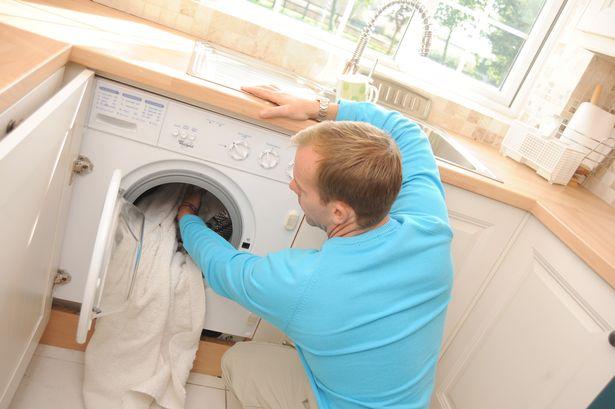Many families across the UK are looking for ways to cut their energy bill before prices shoot up in April.
The regulator Ofgem has announced its price cap will rise by 54%, putting an average household’s energy bill up to £1,971 per year.
Prices are also expected to increase further in October 2022 when the price cap changes again.
To help lower your bill, laundry expert and CEO of Laundryheap, Deyan Dimitrov, has shared seven clever washing machine tricks to reduce energy consumption.
This also includes the best time to do your washing to keep your bills down.
Run your machines late at night or early in the morning
Running your washing machine or tumble dryer at certain times during the day adds to your energy bill if you're on an Economy 7 tariff.
Between 4-7pm is thought to be the most expensive time to wash or dry your clothes, as an increased demand during these hours can make electricity more pricey depending on your tariff.
On the flip side, energy prices will be at their lowest between 10pm and 5am. So try to use your machines during this time. However, make sure you follow fire safety guidance and never put a load on then head to bed for the night.
Similarly, if you need to dry your clothes during the day, the timing of your tumble drying cycles can also help save you money.
For instance, if you switch your loads while the dryer is still warm from a previous cycle you can conserve the remaining heat inside the dryer for your next load of clothes. This will then help shorten your drying time.
A colder cycle is better
Washing clothes at colder temperatures for a shorter time can make your machine more energy efficient. For example, a 30-degree cycle can cut your washing machine’s energy use in half, in comparison to a 40- to 60-degree cycle.
It's also more cost effective to use hot washes for bedding, towels and sportswear which are likely to hold more bacteria. You can save even more by using the eco setting on your washing machine, if it has one.
For drying, a cooler cycle might take longer, but it ends up consuming much lesser energy and you'll also be less likely to over-dry your clothes - if your clothes come out warm to the touch, they’ve been in for too long.
Wash large loads, but don't overpack
It's more efficient to do larger loads of laundry, but an overpacked washing machine or dryer may not wash or dry your clothes properly. So make sure to fill your machine with a suitable load.

A good tip to ensure that your machine will run as efficiently as possible is to check if you can still touch the top of the basin after filling a washing machine or dryer with your laundry.
If you aren't able to fit your hand among the clothing, this means your machine is packed too full.
Also, make sure you've untangled your laundry before loading them into a washing machine or dryer, as smaller items can get wrapped up in bigger items of clothing, which results in them not getting washed or dried properly.
Cost of Living
Our Cost of Living team of experts are here to help YOU through a very difficult year.
They'll be bringing you the latest money news stories and also providing specialist advice.
Whether it's rocketing energy bills, the cost of the weekly shop or increased taxes, our team will be with you all the way.
Every Thursday at 1pm they will take part in a Facebook Live event to answer your questions and offer their advice. Visit facebook.com/dailymirror/live to watch. You can read more about our team of experts here.
If you have a question - or want to share your story - please get in touch by emailing webnews@mirror.co.uk.
Maintain your machines
Clean your machine every three months to ensure it works in top condition.
To clean, you can pour two cups of white vinegar into your machine’s detergent drawer, and run your machine on its hottest cycle. After the first cycle, add half a cup of baking soda directly into the basin and run a hot cycle again.
Another option is to run a hot cycle with a limescale removing product. This helps to get rid of any build-up that could affect the performance of your machine.
For your dryer, regularly clean its lint filter, after each cycle if possible. Accumulated lint and hair - even from one cycle - can hinder your machine from properly drying big and dense items.
Use bio capsules for more effective stain removal
Bio capsules or bio laundry detergent are best suited if you want to wash your clothes at lower temperatures. These products have enzymes that can be activated at lower temperatures so they will be better at breaking down your clothing’s dirt and stains during a colder wash.
However, its also worth noting that non-bio detergents - while not quite as suited for cold washes- have less harsh enzymes which makes it a better choice for sensitive skin.
Dryer balls are a good investment
Using wool or rubber dryer balls helps separate your clothes and increase their exposure to airflow during a cycle in the dryer. This reduces drying time and the length your dryer needs to run for, saving you energy.
Wool balls can even soak up some of the moisture in your machine which helps cut down drying time even more.
Air dry when possible
Your tumble dryer uses the most energy out of all standard household cleaning appliances. So air drying your clothes can definitely help cut down on energy costs.
However, given that we're still in winter, drying clothes outside may not be an option just yet. Instead, pop your clothes in front of a radiator, preferably with doors closed, to create a small heat vacuum.
Read More
Read More
